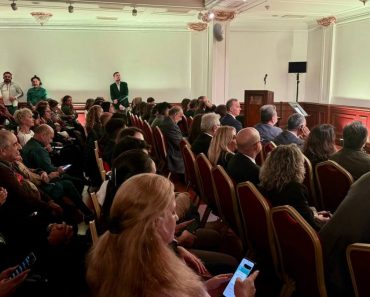Over 100 women, mostly of Greek Australian background, attended a public talk by Professor Liza Tsaliki from the National and Kapodistrian University of Athens on Thursday, 6 November, at RMIT University.
Professor Tsaliki’s lecture, Still Seen, Still Desired: Women Over 45 in Western Society and the Role of Media and Culture, examined how women over 45 are portrayed—and often marginalised—across media and celebrity culture. Drawing on examples from Greek popular culture, including music icons Kaiti Garbi, Despina Vandi, and Anna Vissi, and television personality Eleni Menegaki, Professor Tsaliki explored “the contradictions ageing women face: being seen as sexual, expected to care for both children and ageing parents, while remaining professionally active and socially relevant.”

A partnership of ideas and friendship
The event was opened by Professor Sean Redmond, Associate Dean of Media, Writing and Publishing at RMIT, who co-hosted the event with Neos Kosmos.
Professor Redmond said it was “an incredible privilege for the School of Media and Communication to partner with that meteor of a Greek Australian newspaper, Neos Kosmos, and with the University of Athens—one of the most prestigious universities in the world.”
“This is not a partnership of convenience or happenstance,” he added, “but one between friends. I’ve known both Fotis [Kapetopoulos] and Liza for close to ten years, and their infectious, compelling, and rebellious attitude to art, life, and knowledge has greatly inspired me.”

Professor Redmond acknowledged the First Nations people of this land and thanked Neos Kosmos publisher Christopher Gogos, Dr Fotis Kapetopoulos, Professor Lisa French, Dean of the School of Media and Communication at RMIT, and Professor Ingrid Richardson, Associate Dean of Research, for supporting the event.

He became emotional as he acknowledged his colleague, Dr Alexia Kannas, Senior Lecturer in Cinema Studies at RMIT, “who initiated Liza’s visit but could not be with us tonight.”
A forum for Greek Australian women’s voices
Dr Fotis Kapetopoulos, journalist at Neos Kosmos, took to the stage to introduce Professor Tsaliki, who too acknowledged the First Nations people of Australia saying, “as Hellenes, our humanism — our universal understanding of what it means to know oneself — demands that we respect those who were here for millennia before us.”
Dr Kapetopoulos pointed to Neos Kosmos research, which shows “that Greek Australian women over 45 with tertiary qualifications are among the most loyal readers”.
“That is why we wanted to create a forum for you — a place for thoughtful discussion, for engagement, and for recognition of your voices as Greek Australian women and the immense contribution you all have and continue to make.”

Dr Kapetopoulos said that Professor Liza Tsaliki “was one of the first scholars I encountered exploring the complex intersection between media, celebrity, femininity, and sexuality — all within a Greek context”.
“That struck me, and when I spoke with our publisher, Christopher Gogos, we both agreed: This is exactly the kind of dialogue Neos Kosmos should be fostering”.

He said that Professor Tsaliki, the Head of the Department of Communication and Media Studies at the University of Athens, “is an internationally recognised scholar whose work explores political participation, celebrity, gender, technology, and constructions of femininity”.
Reclaiming visibility and desire
Professor Liza Tsaliki then took to the stage and, over 45 minutes, delivered an engaging, at times controversial, and always thought-provoking exploration of how ageing, femininity, sexuality, and power intersect in the dialectic between society, media, and celebrity.
“In societies where youth is glorified,” she argued, “the sexuality of older women is often perceived as subversive—a form of power that challenges narrow cultural scripts about desire and femininity.”

Professor Tsaliki underscored the “neo-liberal” ways in which these women “assert visibility and allure” while appearing to reject impossible beauty standards. “I’m intrigued by the kind of ageing experience these women offer, because they embody neo-liberal demands for youthful focus—bodies are expected to be lean and toned, faces filled, and there is no grey hair to be seen.”
She added that she wanted to “steer away from any kind of Helladic gaze about the Australian diaspora that suggests Greeks in Australia are somehow more traditional or backwards.” Instead, she emphasised the “transcultural negotiations and diasporic exchanges shaping contemporary Greek femininities.”
Using a range of media, including Neos Kosmos, Professor Tsaliki analysed how Greek celebrity culture sparks conversations about ageing, gender, and identity both in Greece and the diaspora.
The lecture was followed by a Q&A from the floor and closed by the Managing Director of Neos Kosmos, Christopher Gogos, who reiterated what Dr Fotis Kapetopoulos said, “how Neos Kosmos can keep telling Greek Australian stories and continue the dialogue through the support of subscribers.” The crowd later mingled and met Professor Tsalikis over refreshments.
The women speak
One attendee, Jill Taylor-Nikitakis, former president of Fronditha Care, described the evening as “a great initiative by Neos Kosmos and RMIT,” saying that while she “may not have agreed with everything, it was fantastic to see Neos Kosmos getting this sort of discussion going.”
Dr Melina Malos from the University of Melbourne added that she “enjoyed the talk immensely,” noting that “it spoke to a kindred audience” and resonated with her own research on how young Greek migrants navigate identity.
Among the audience were leading Greek Australian women, including Professor Joy Damousi, Anthea Sidiropoulos, Professor Magdalena Simonis, Jill Taylor former Fronditha chair, Dr Melina Malos from the University of Melbourne, senior lawyer and government adviser Helen Karagiozakis, Cr Helen Polites (Deputy Mayor of Merri-bek), Eugenia Mitrakas OAM, and SBS journalist Dina Gerolymou, among others.
The event was presented by Neos Kosmos, RMIT’s School of Media and Communication, and the National and Kapodistrian University of Athens.







